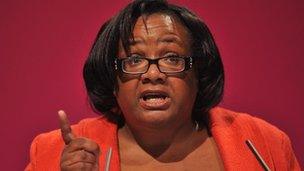Diane Abbott: British culture 'increasingly pornified'
- Published
- comments

Ms Abbott wants to bring family values to the forefront
British culture is "increasingly pornified" and is damaging young people, shadow health minister Diane Abbott has warned.
She believes that the rise of sexual bullying and "sexting" - where people send sexually explicit text messages - is a result of hyper-sexualisation.
A "revolution in sex education" to help tackle the problem is needed, she says.
She urged a "national conversation" between parents and children about sex, porn and technology.
There have been increasing concerns over the commercialisation and sexualisation of children, the ease with which pornography can be accessed through the internet and the way in which young people use text messages and emails to exchange sexually explicit images.
In 2011, the head of the Mothers' Union, Reg Bailey, carried out an independent review, external for the government looking at the pressures on children to grow up too quickly.
It found that nine out of every 10 UK parents said children were having to grow up too early, with 40% saying they had seen things in public places, such as shop window displays and advertising hoardings, that they felt were inappropriate for children to see because of their sexual content.
'Pressure to conform'
Ms Abbott, whose brief covers public health, told BBC Radio 4's Woman's Hour: "Of course, sex is great. We don't have to pretend otherwise. But people shouldn't feel victimised by a pornified culture and girls shouldn't be forced to do things they don't feel comfortable with."
She called for better sex education in schools and urged parents to "talk about these matters" with children and teach them how to "say 'No'".
Ms Abbott said in a speech on Tuesday that fast-developing technology and an "increasingly pornified British culture" has led to a "secret garden, strip-tease culture in British schools and society, which has been put beyond the control of British families".
Of particular concern is the way in which new technology, such as smartphones and the internet, is changing the way in which young people engage with their sexuality, leaving teachers and parents struggling to keep up.
In 2009, the charity BeatBullying found that over a third of young people had received a sexually explicit text or email, with the majority of these coming from peers.
Ms Abbott, who stood for the Labour leadership in 2010, said: "For so long, it's been argued that overt, public displays of sexuality are an enlightened liberation.
"But I believe that for many, the pressure of conforming to hyper-sexualisation and its pitfalls is a prison. And the permanence of social media and technology can be a life sentence.
"Parents and teachers have a duty to ensure that children develop a healthy view of sexuality, distinct from this porn version that is swamping and infiltrating British life. Because it's a very specific form of sexuality that's being imposed, on children and adults: a porn version. This is what kids are dealing with on a daily basis.
"Young people are accessing far harder pornographic images than 10 or 15 years ago."
'Dark corners of the internet'
Many young girls are pressurised into exposing themselves online, Ms Abbott said, and are unaware that pictures posted onto the internet can be there forever.
And she identified sexual bullying known as "slut-shaming", where young women are attacked by their peers for their sexual behaviour, as a symptom of the porn culture.
Compulsory personal, social, health and economic education and also sex and relationship education needs to be considered, Ms Abbott said.
Sex education should be "revolutionised" to better prepare young people for "healthy, respectful, emotionally fulfilling relationships" and deal with issues of self-esteem.
Ms Abbott backed an "opt-in" mechanism for adult content online, with internet users having to make an active choice to allow pornography on their computers or smartphones.
She also said "child friendly" computers that filter out adult content by default should be looked at.
The prime minister's adviser on preventing the sexualisation and commercialisation of childhood, Conservative MP for Devizes Claire Perry, has reportedly urged parents to challenge their children about their mobile phone and social media usage to ensure they are not sending inappropriate messages.
"We've given our children all these opportunities to communicate in private, but we've lost the confidence to actually get involved in that," she told the Daily Mail, external.
In December, the government rejected plans to block internet access to pornography on all computers automatically, saying the move was not widely supported by the respondents to its consultation.
Ministers instead called on internet service providers to encourage parents to switch on a filter to stop access to adult content.
Jon Brown, head of the NSPCC's sexual abuse programme, said "sexting" was taking some young girls "into an underworld of abuse where they are constantly pestered for sex or urged to pose for provocative pictures".
"This is not something that will simply go away, so we have to bite the bullet and confront it by educating and supporting children. Parents also need help to become confident with new technology and to talk to their children about these issues while industry must be encouraged to provide safeguards," he added.
- Published21 November 2011
- Published8 September 2011
- Published4 June 2011
- Published4 June 2011
- Published9 May 2012
- Published15 December 2012
- Published30 May 2012